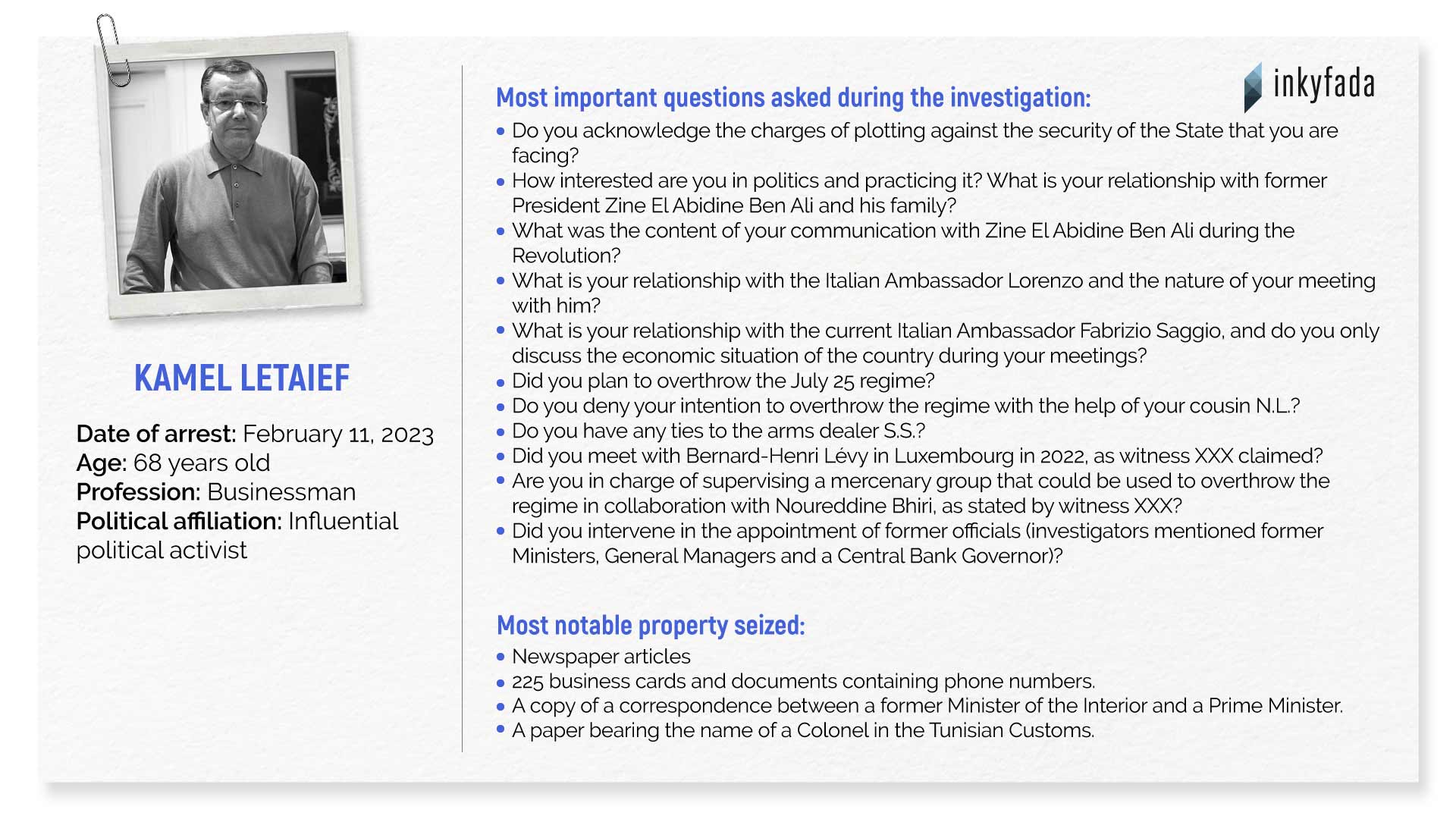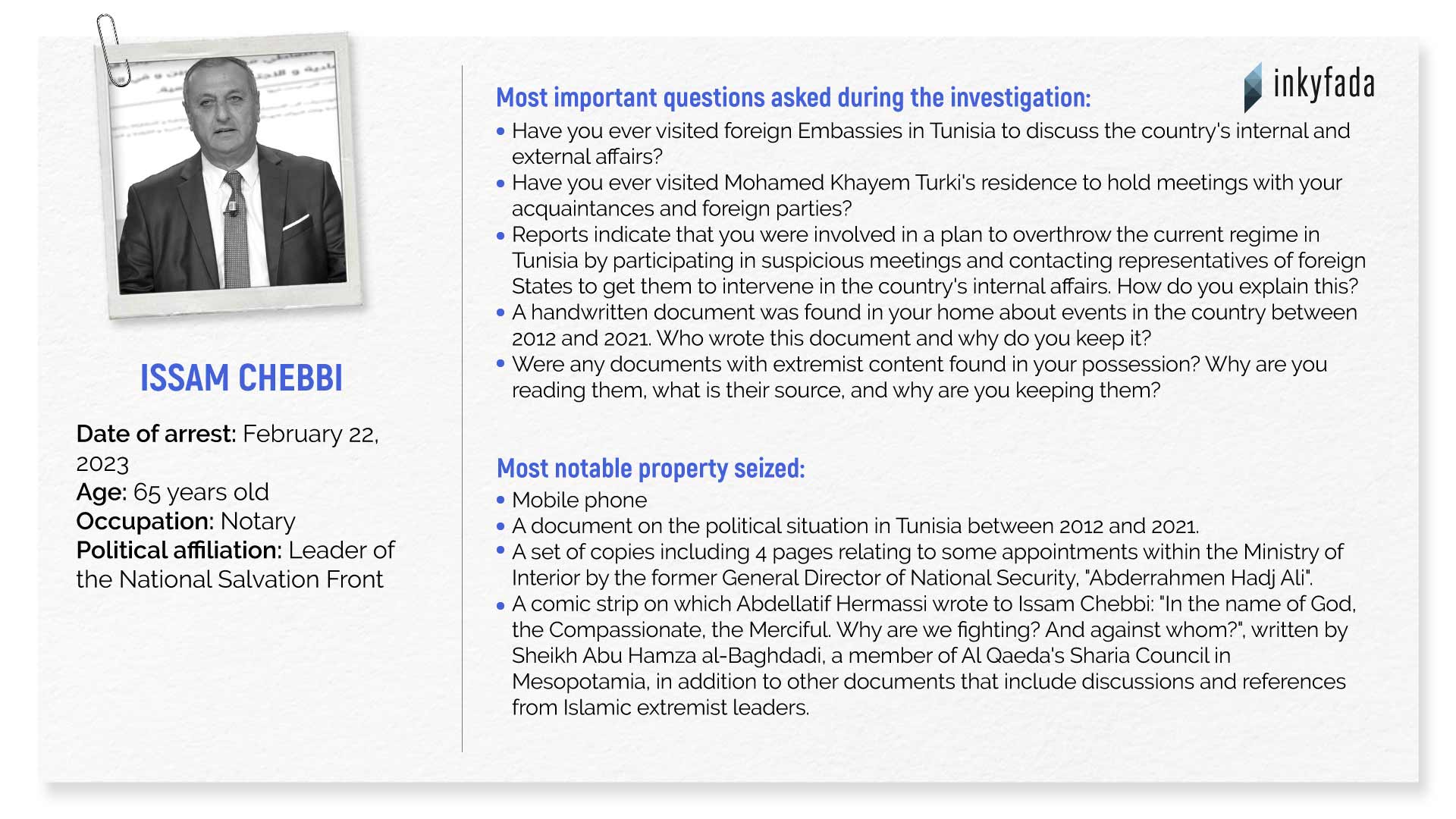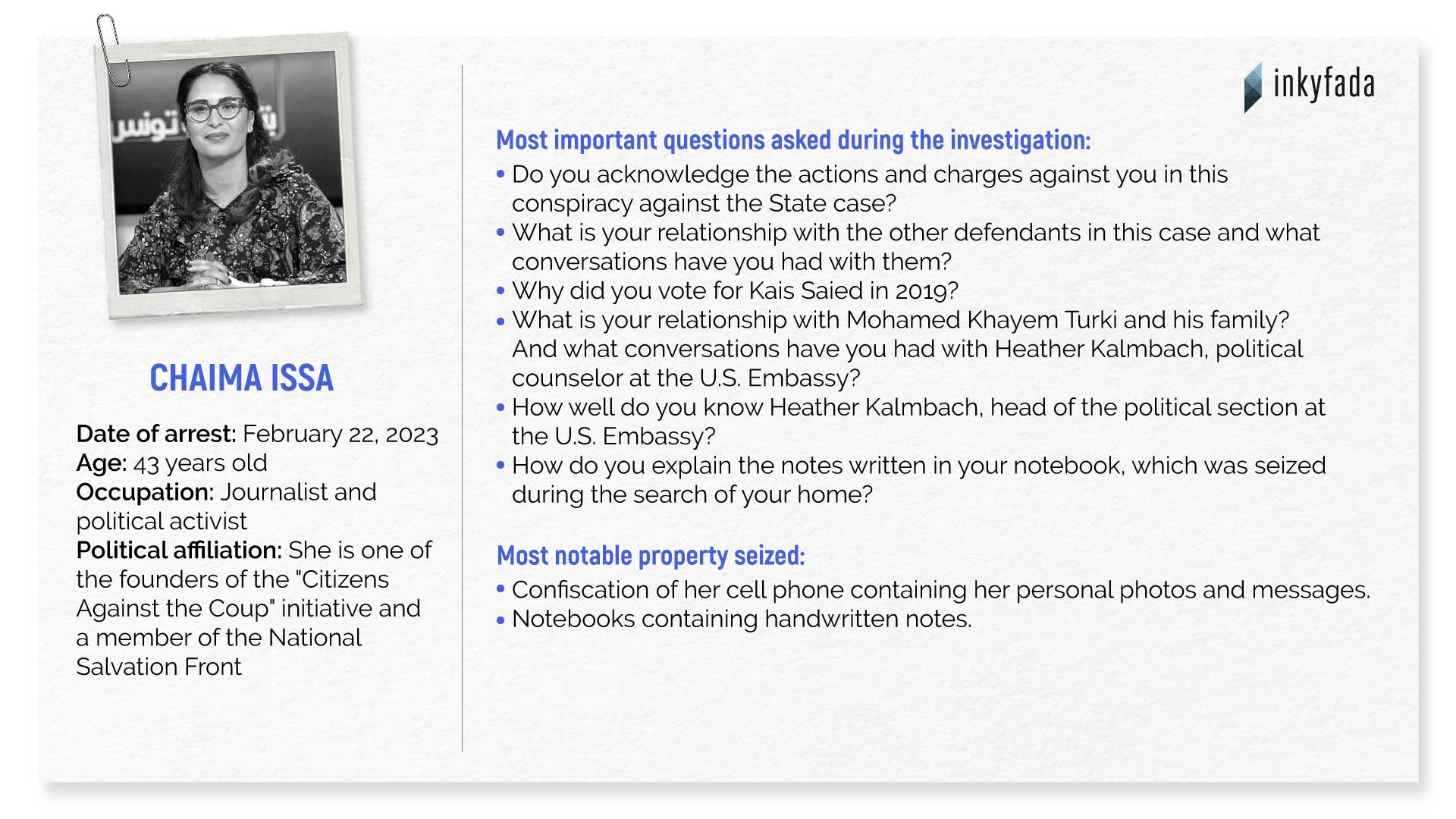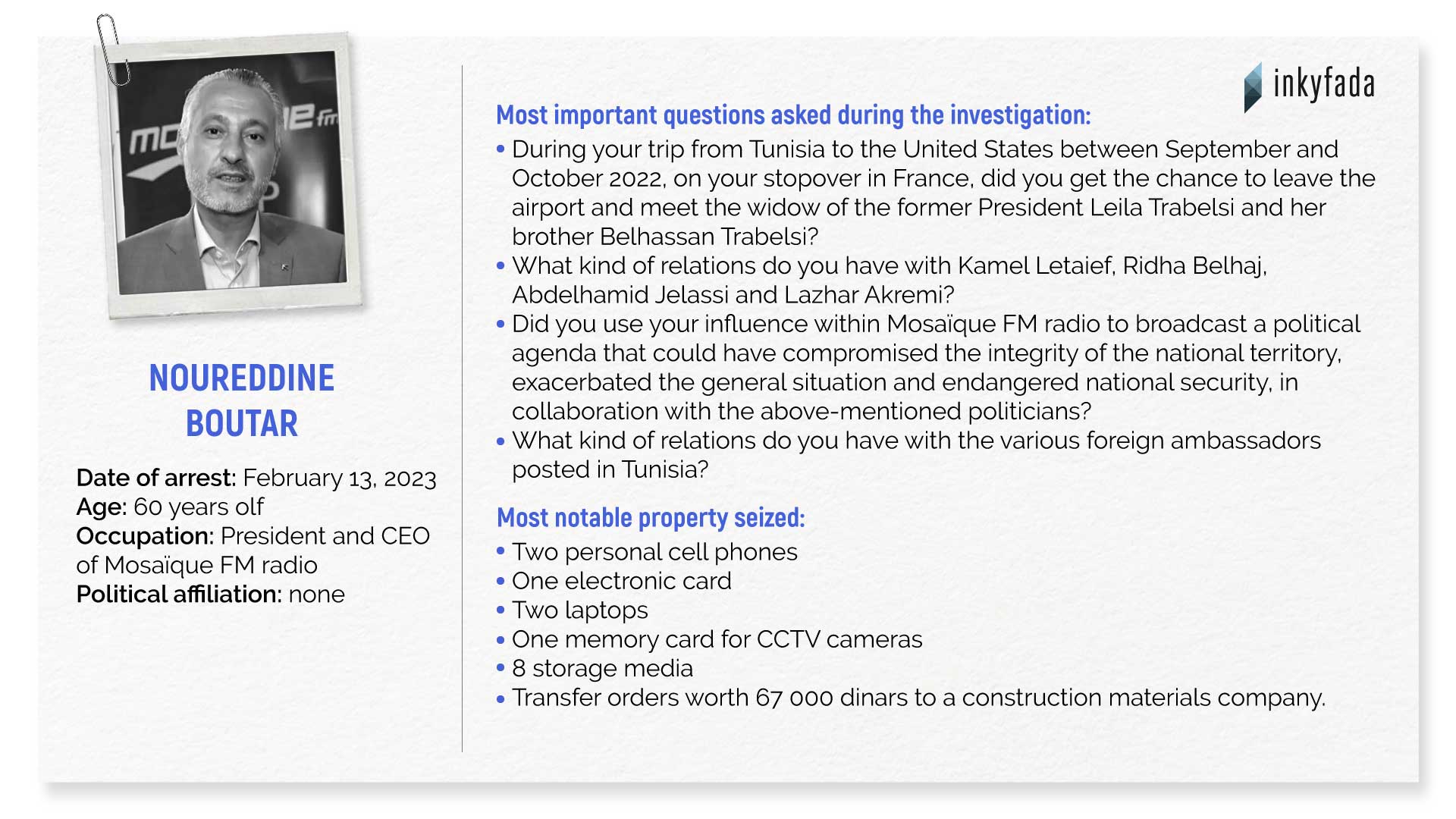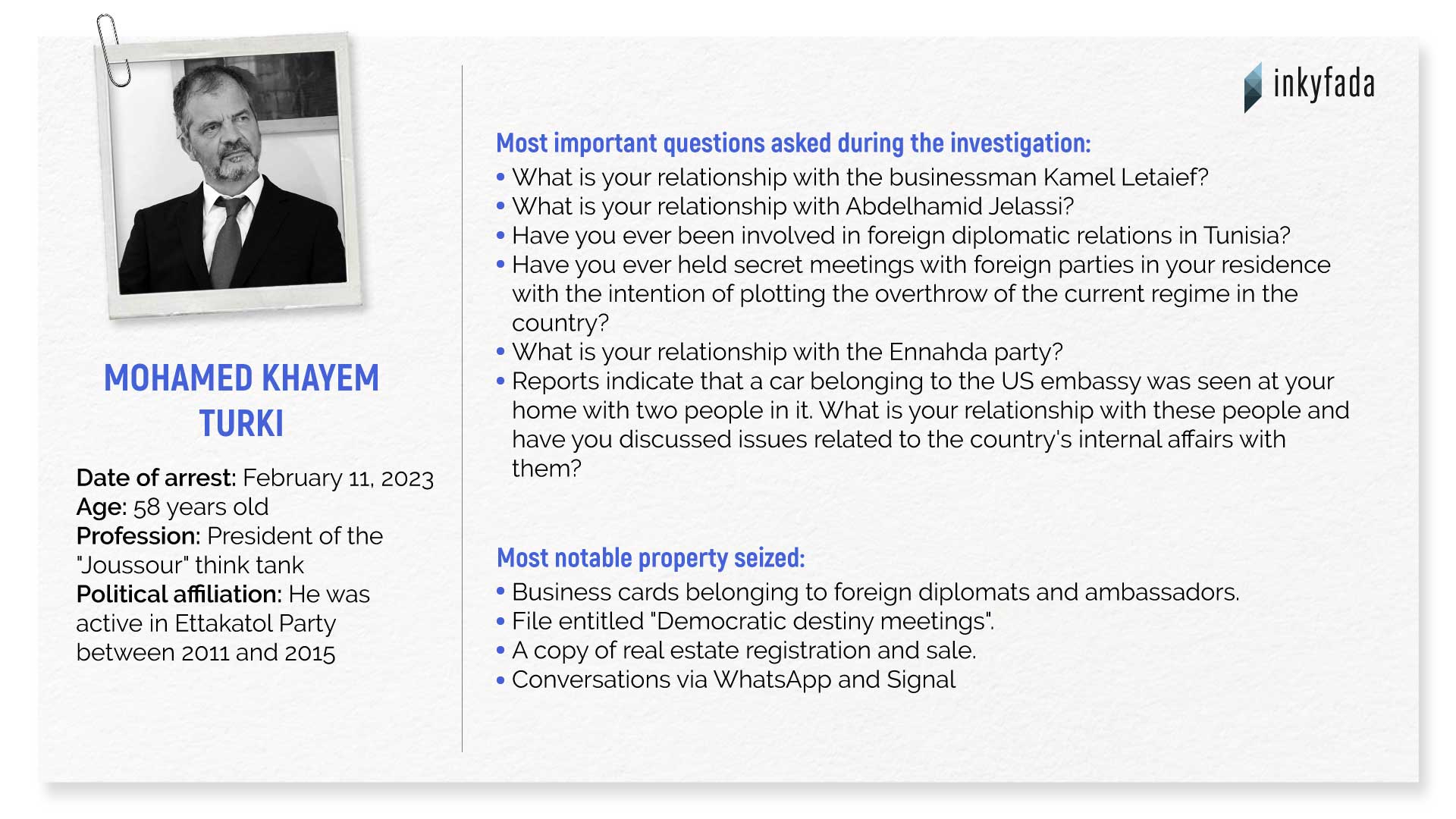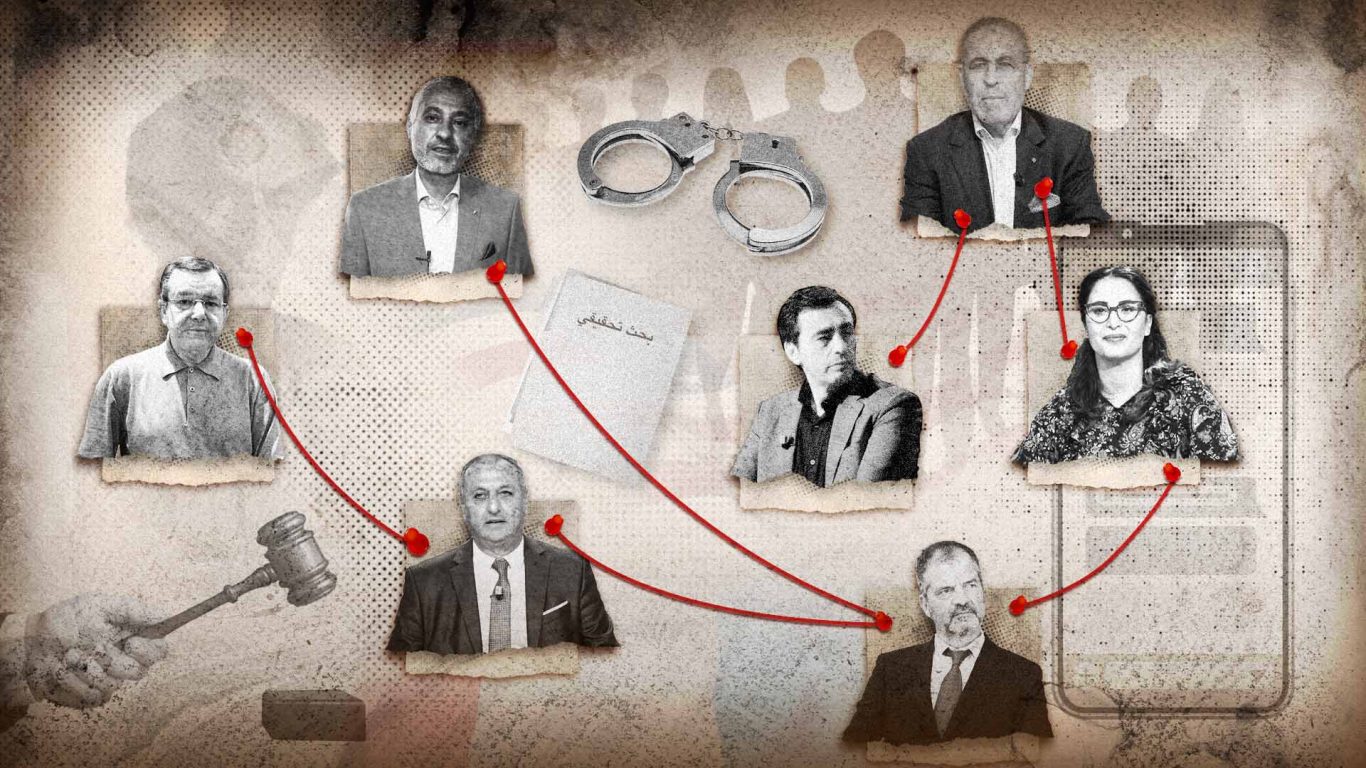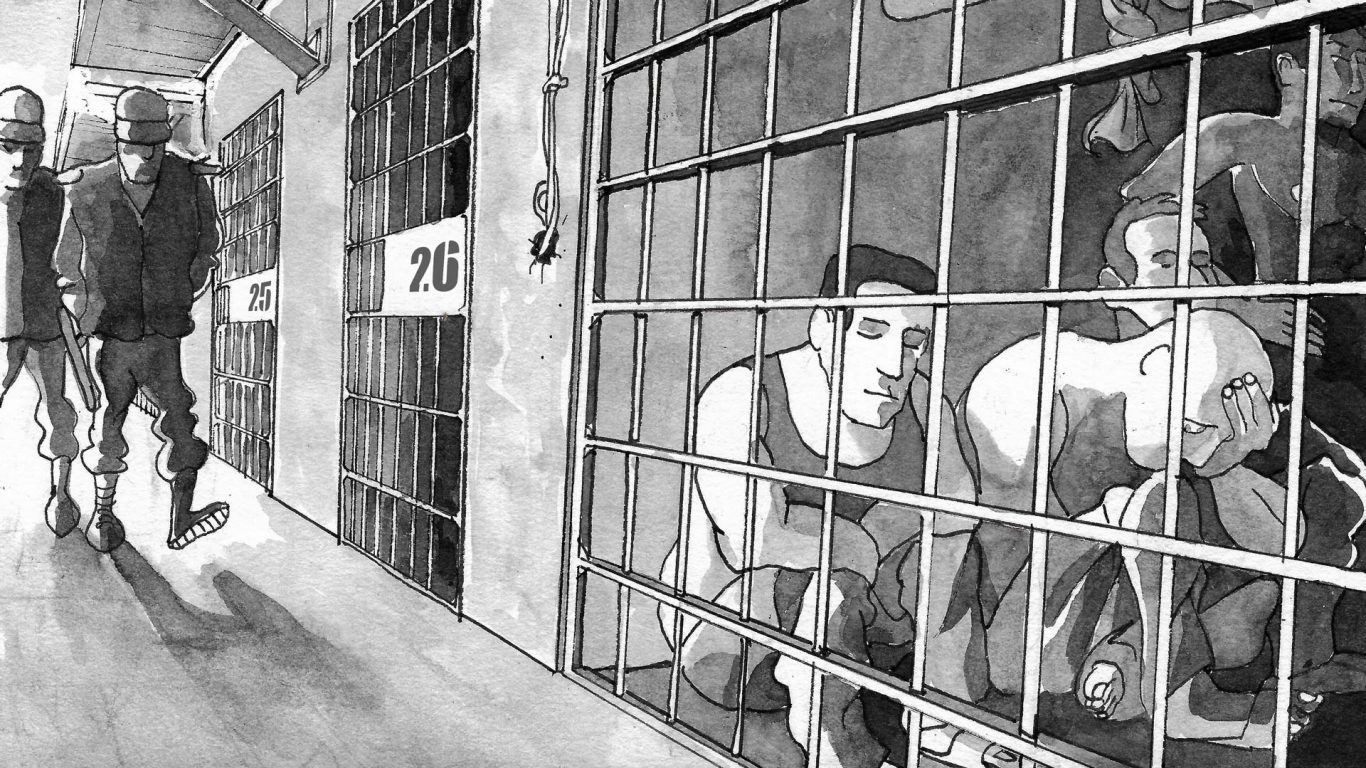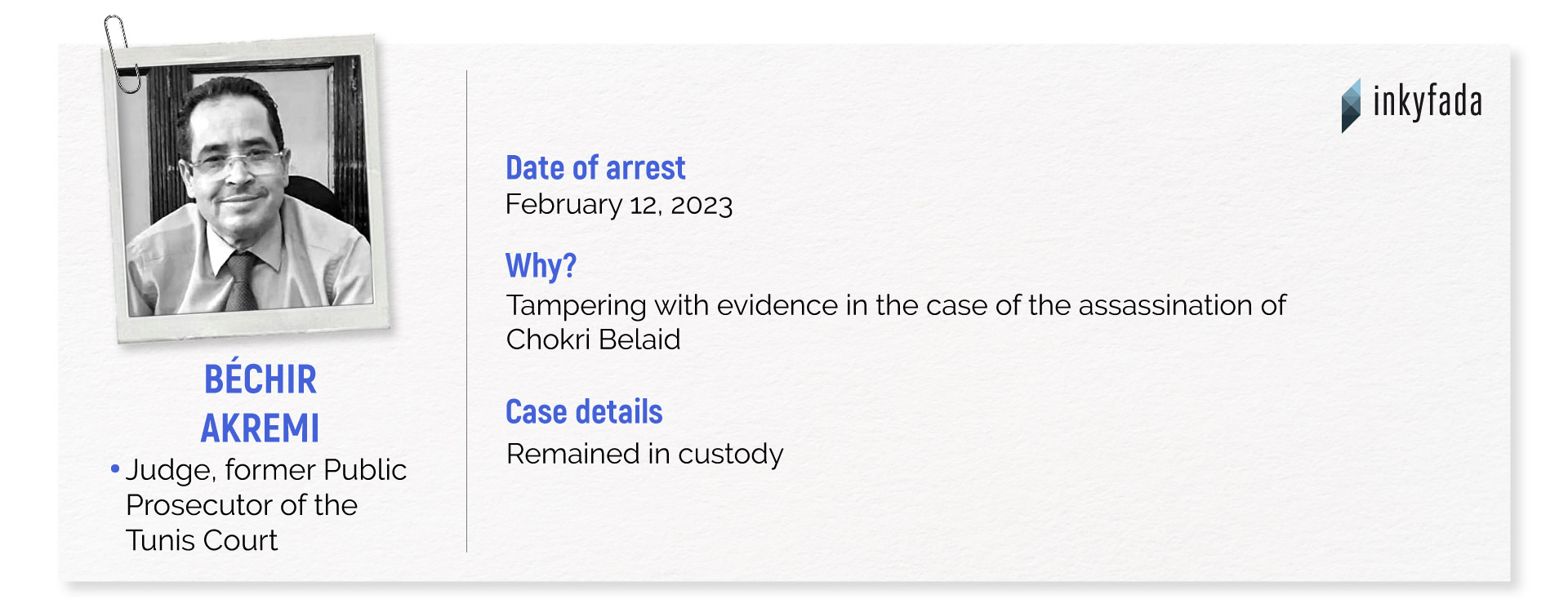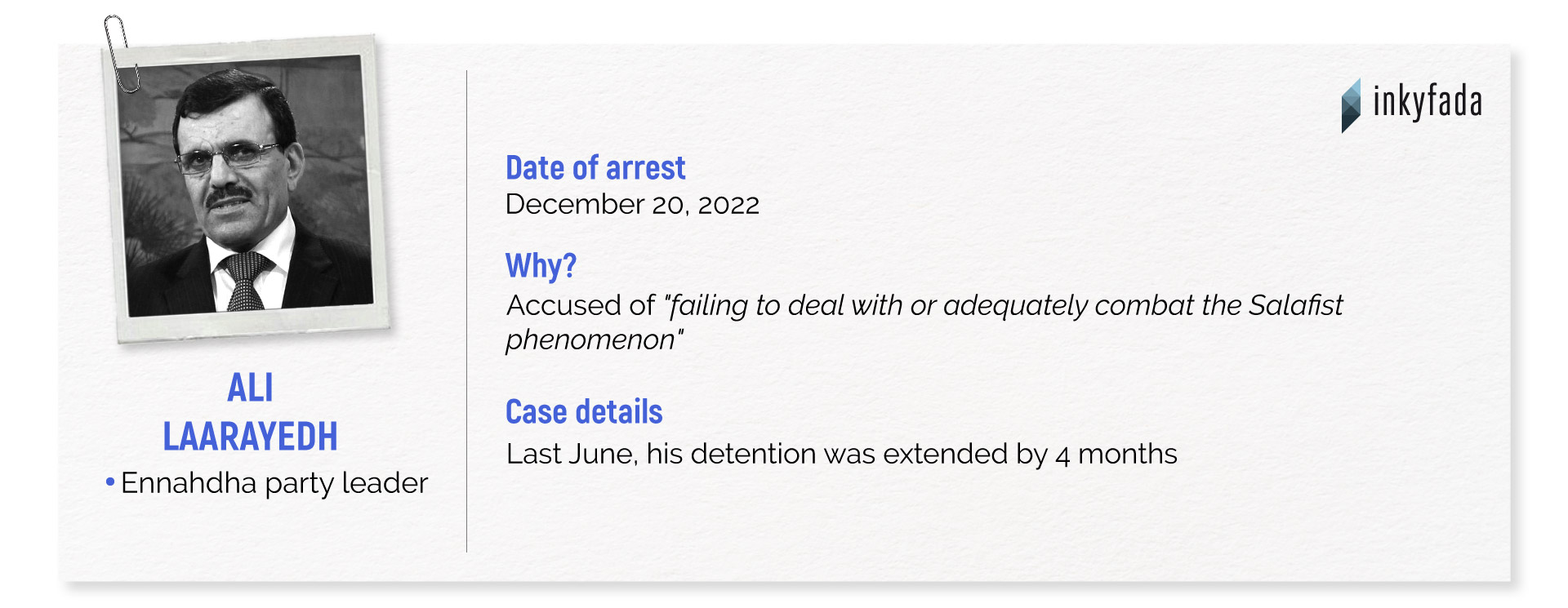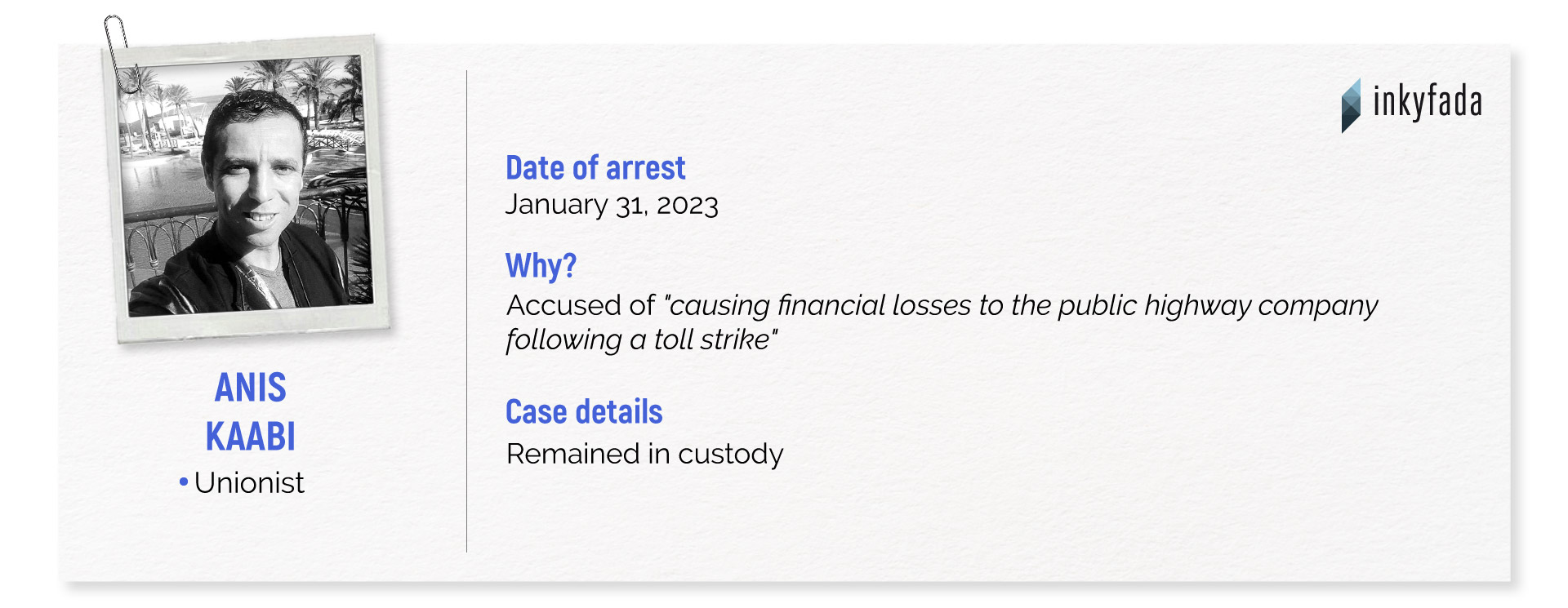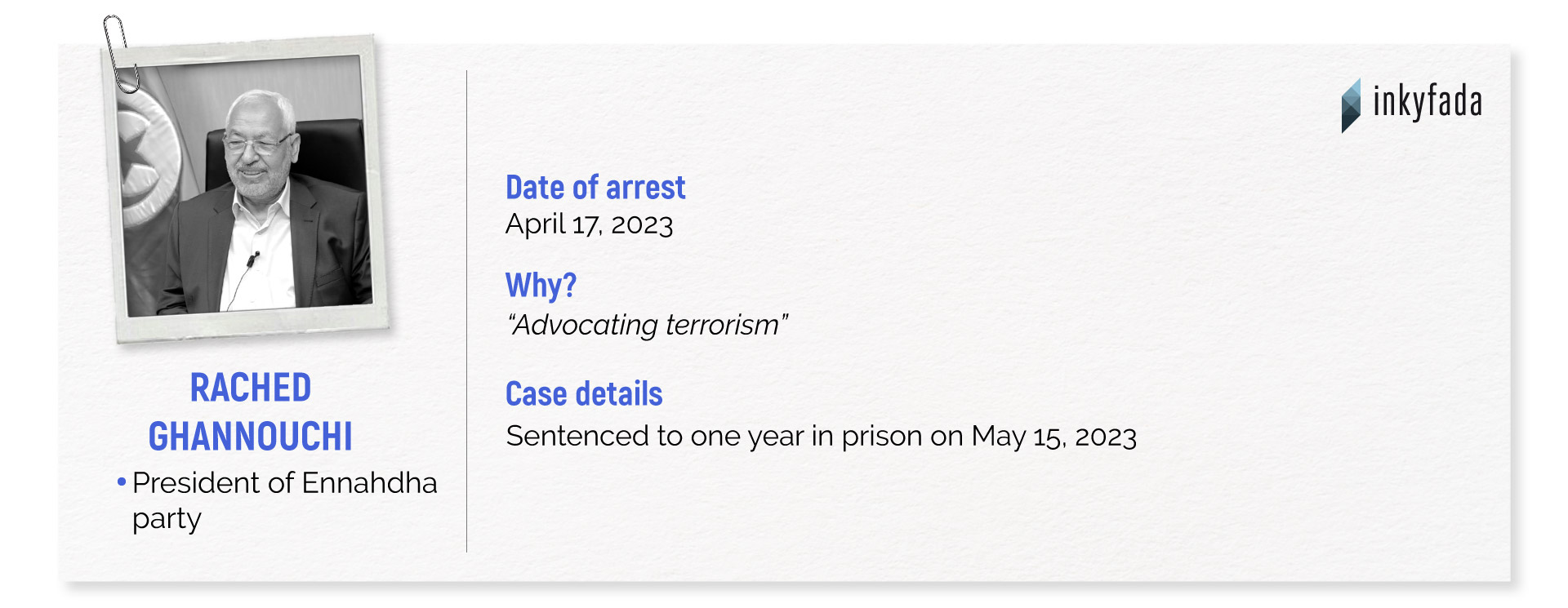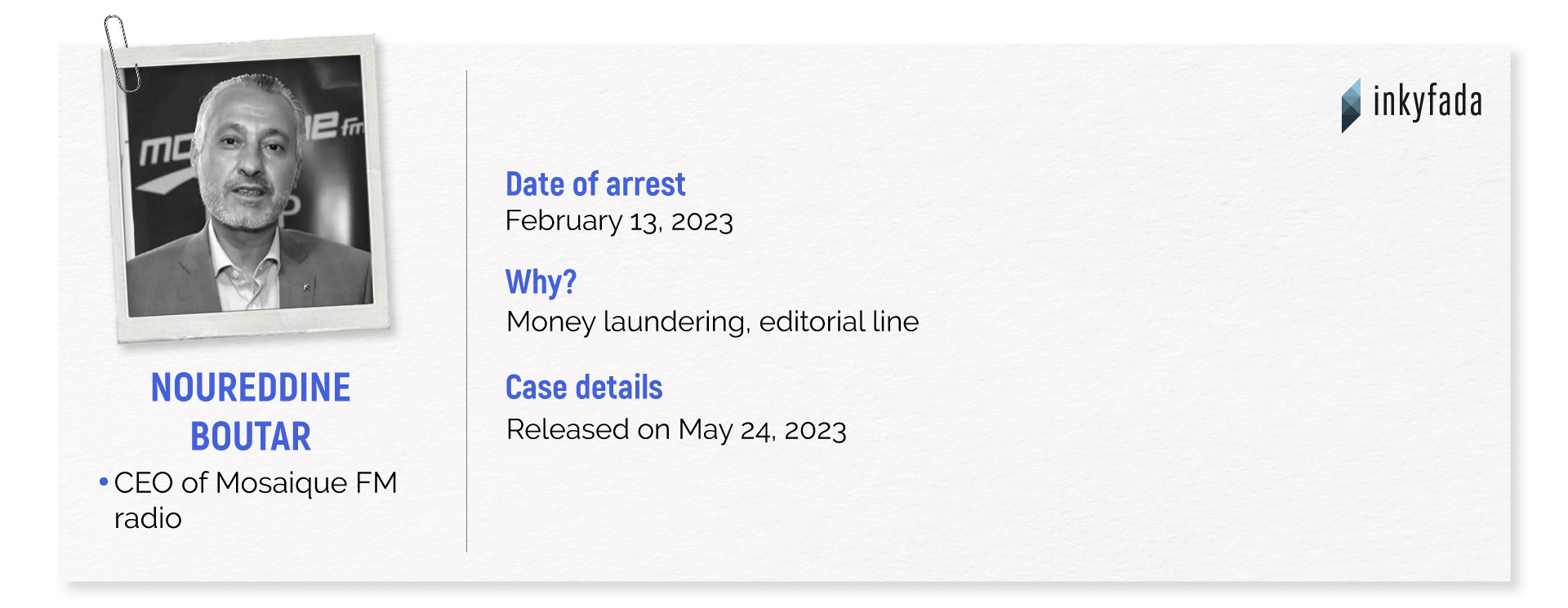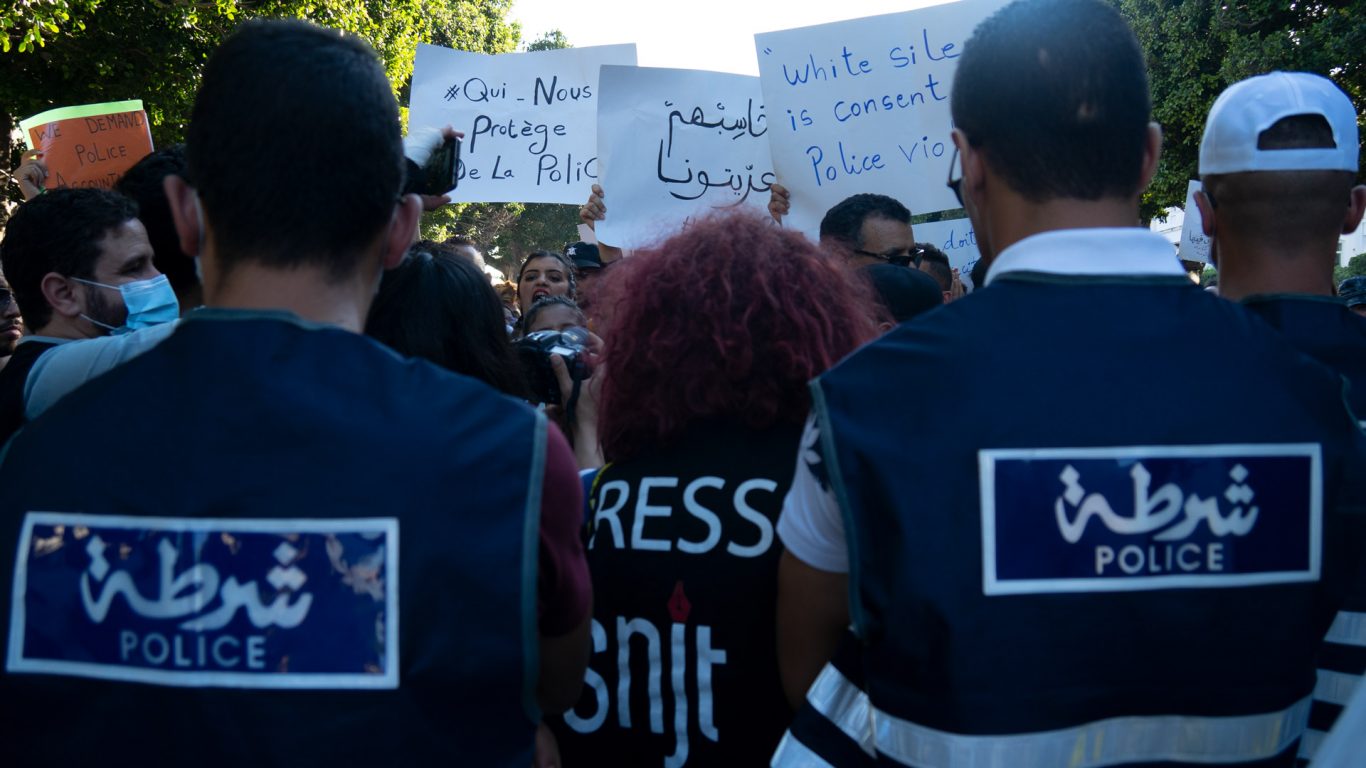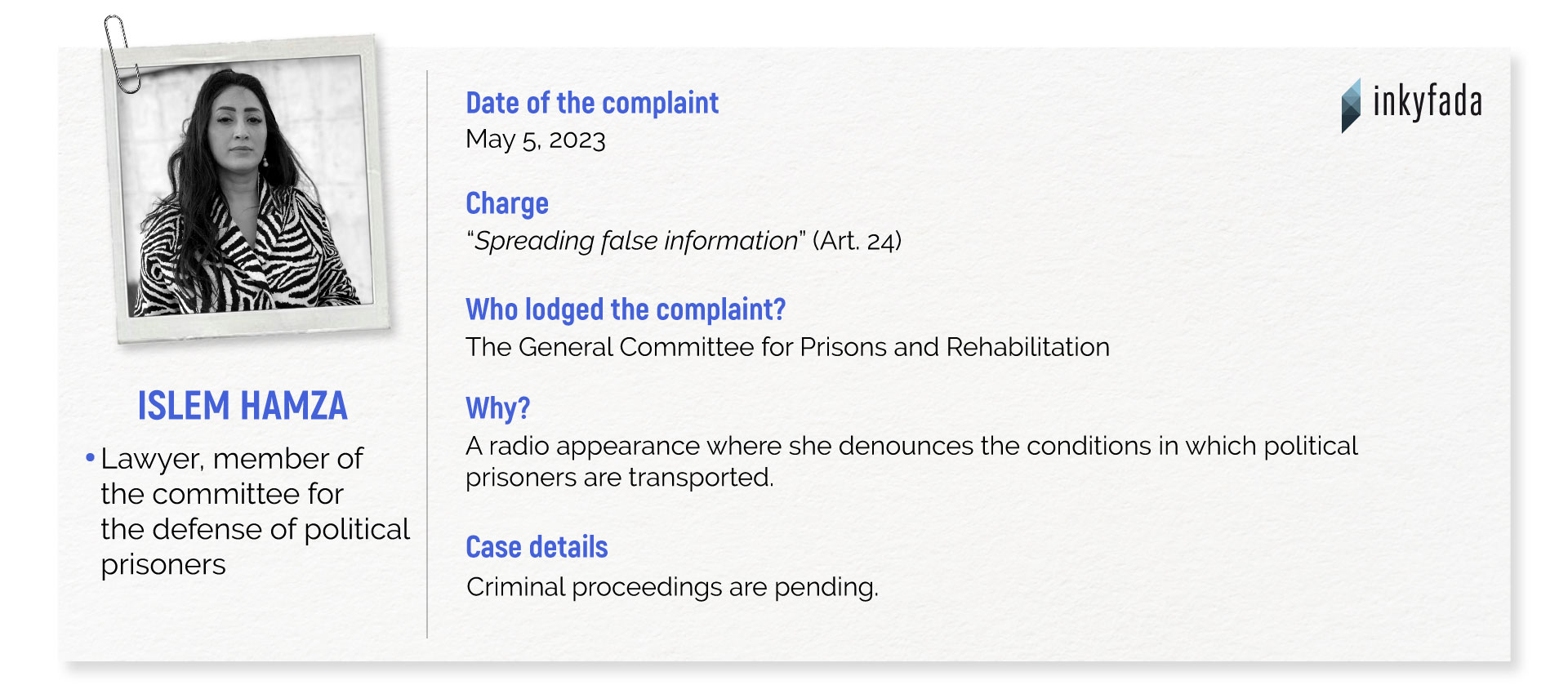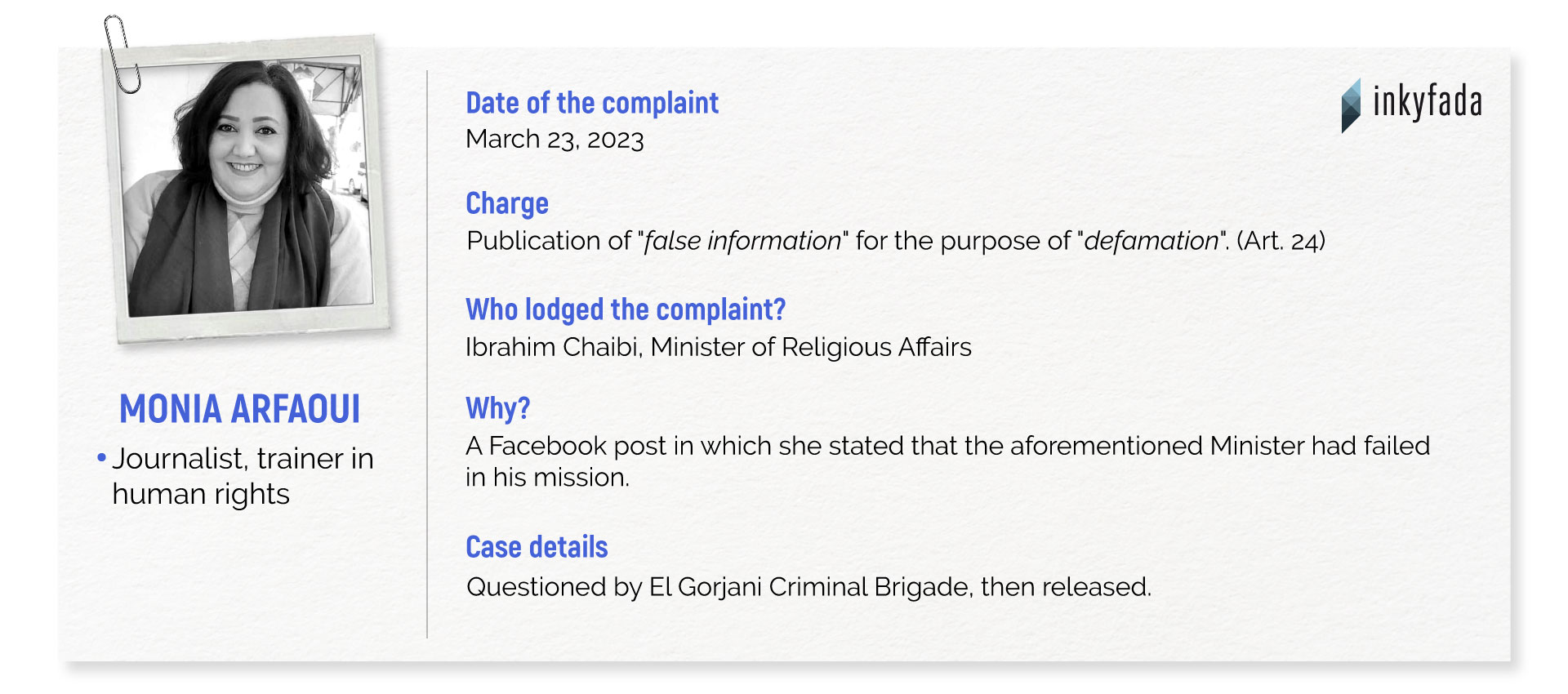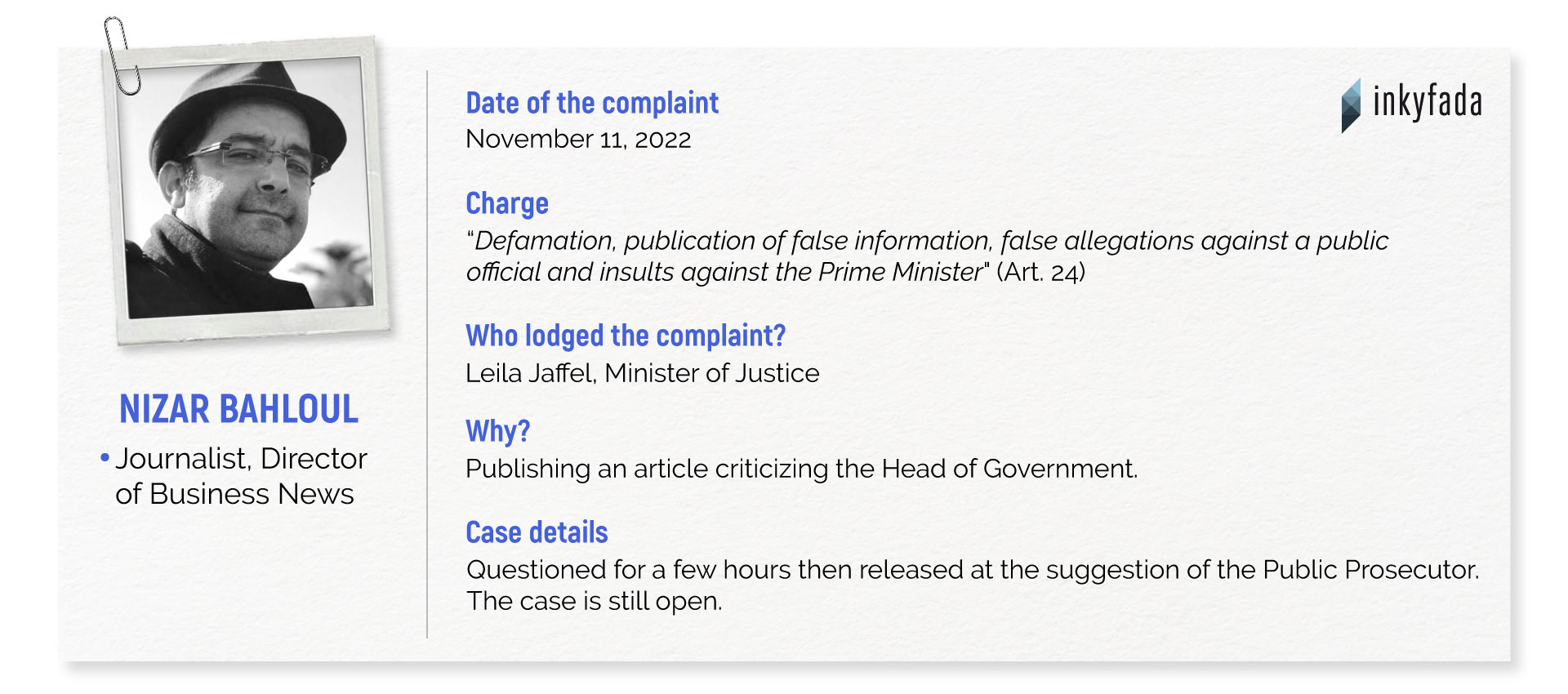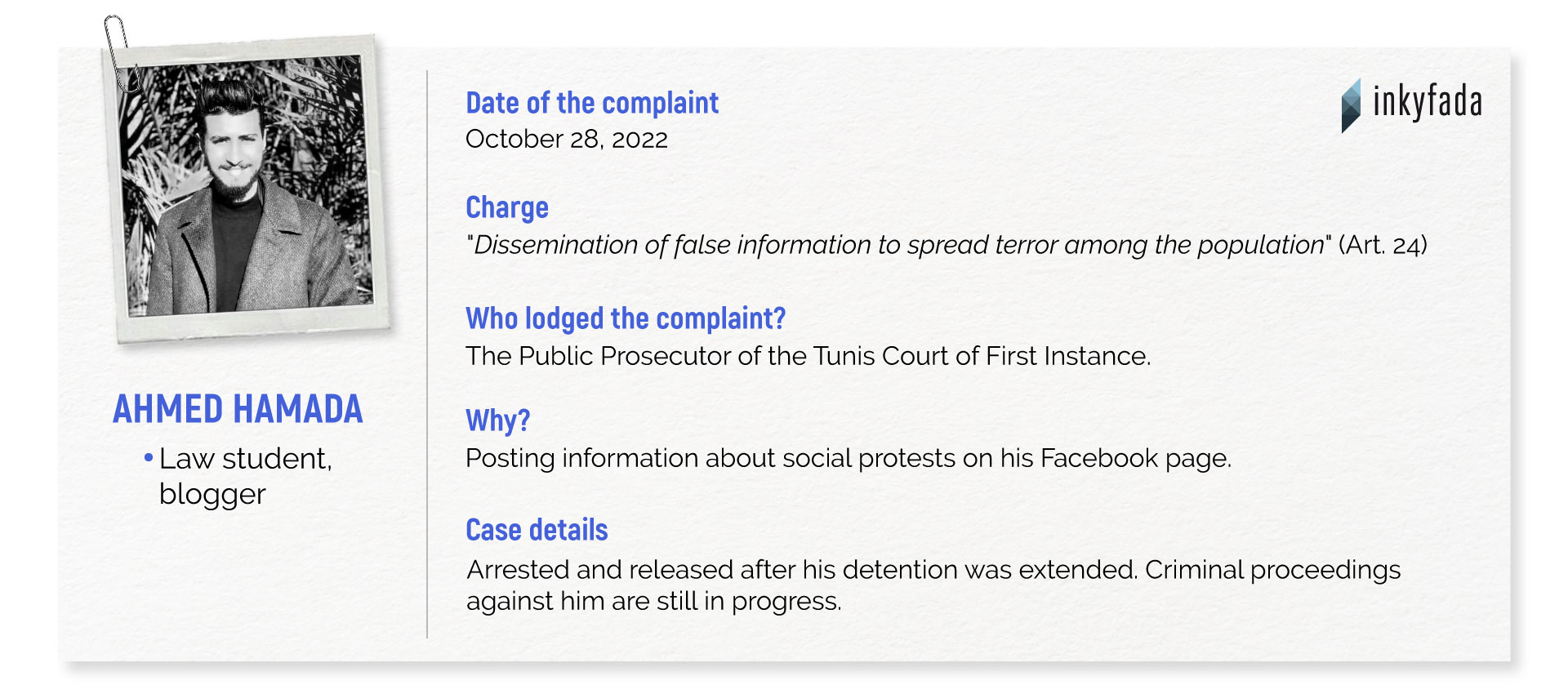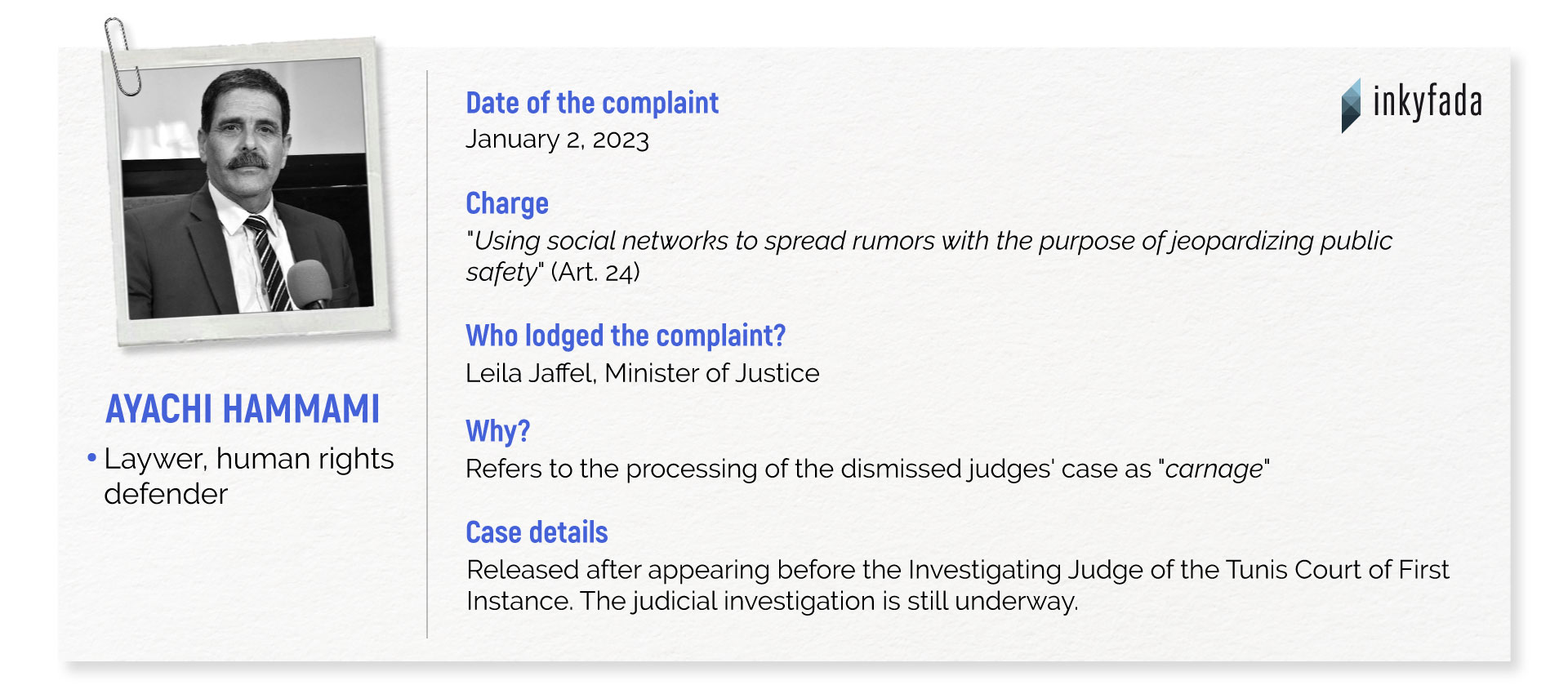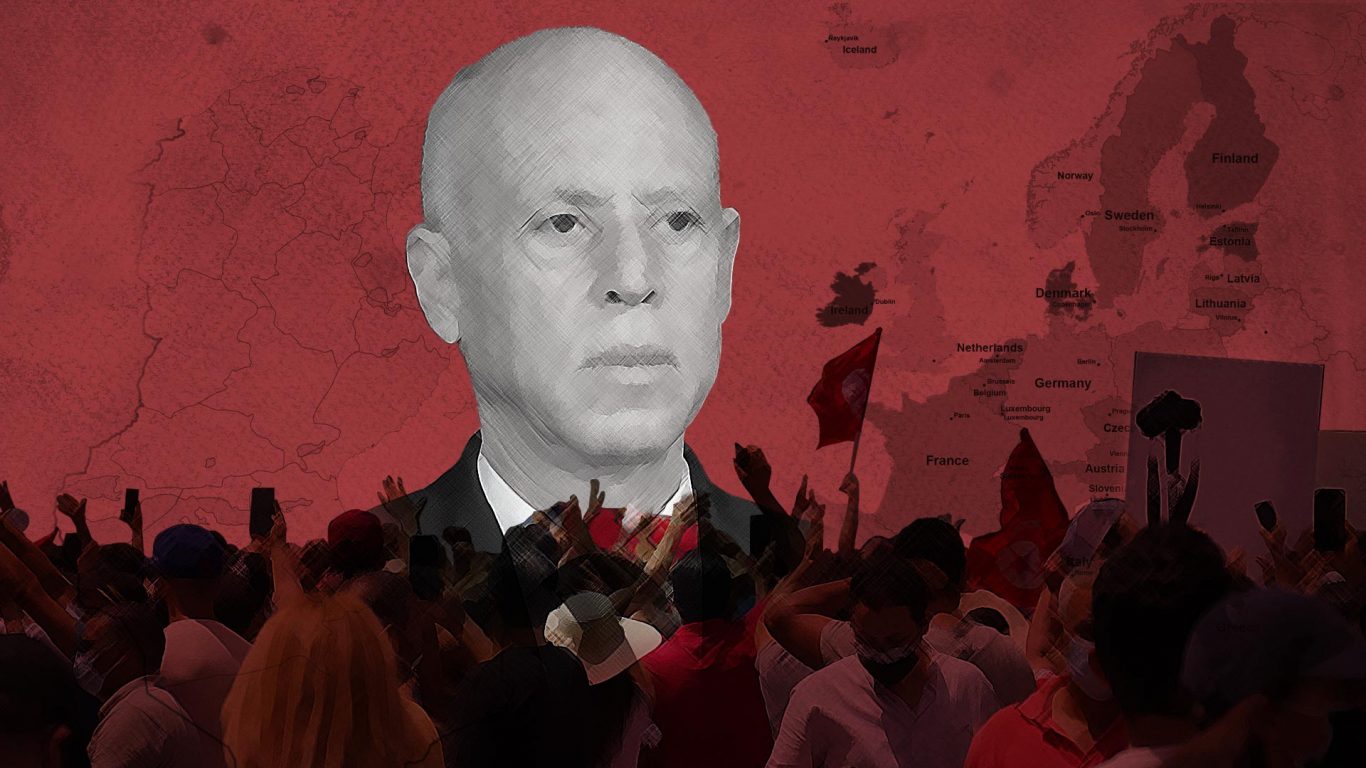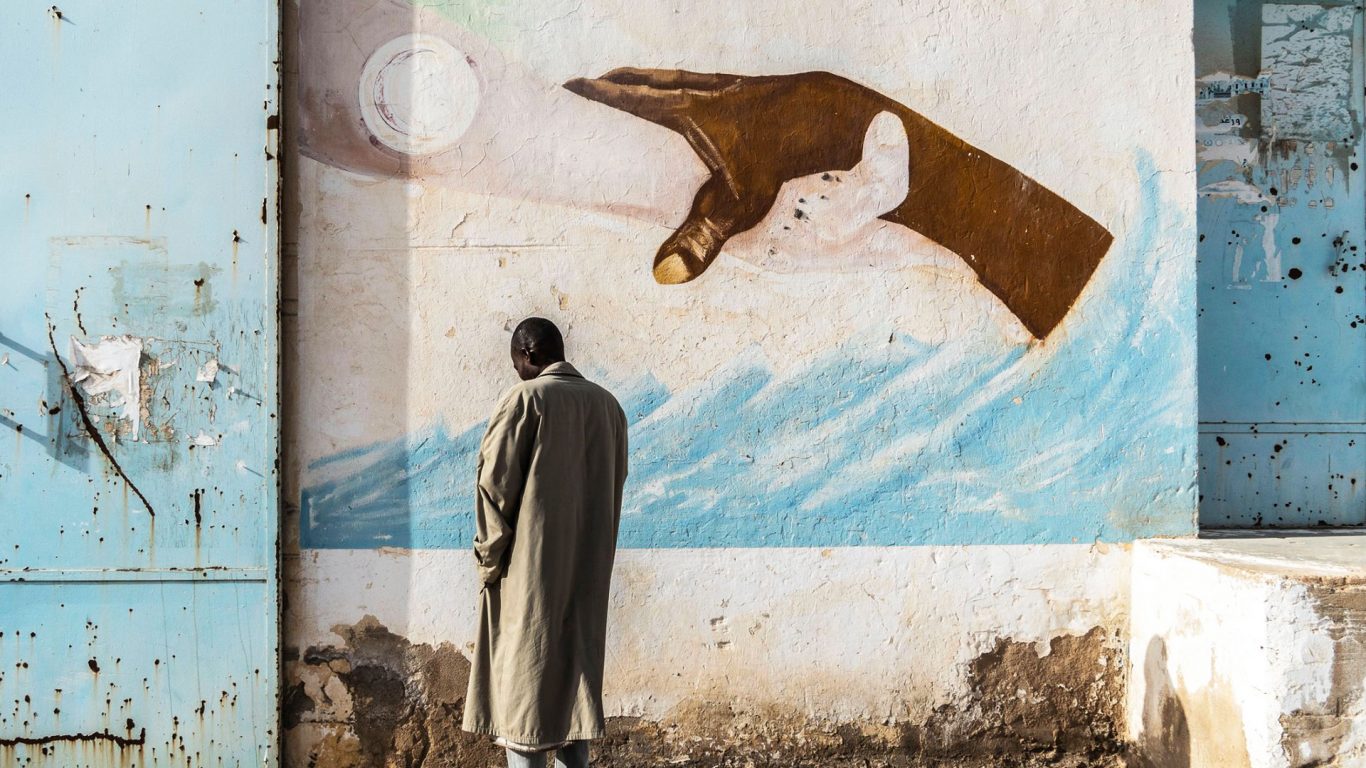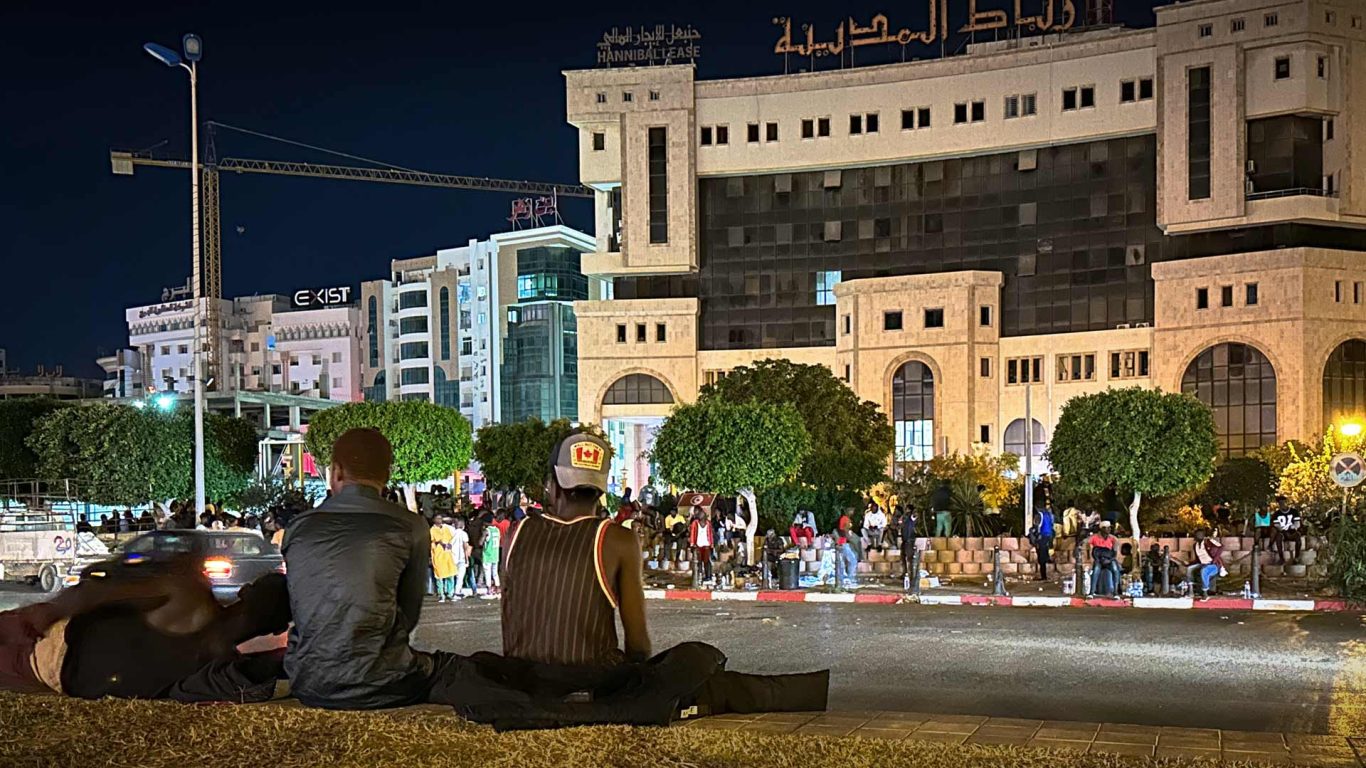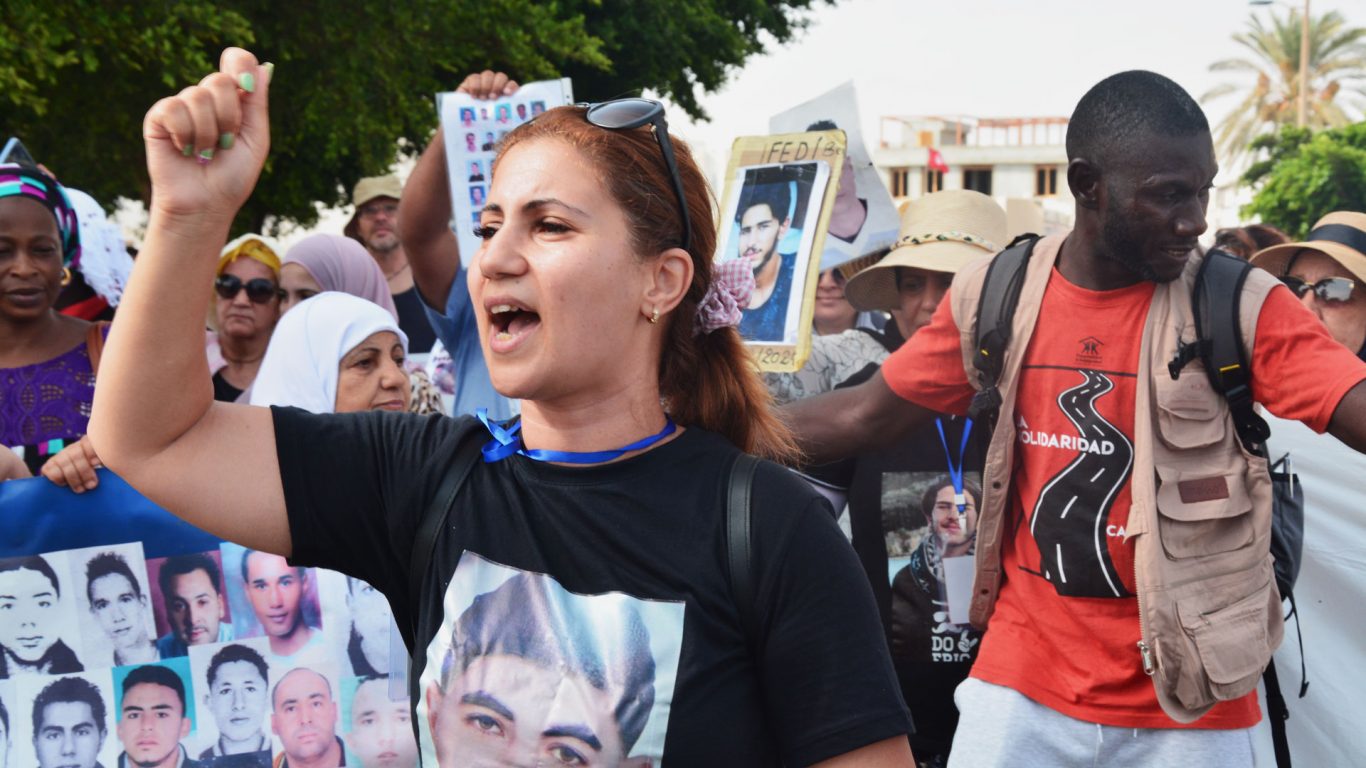On July 13, 2023, under the scorching sun, outside the gates of the Tunis Court of Appeal, around a hundred protesters chanted these slogans and called for the release of the political prisoners, accused of “plotting against State security” and detained for four months.
Tunisia has been swept by a wave of repression for months now. This series of arrests was accompanied by several other lawsuits against journalists and activists, as well as by attacks on the independence of the judiciary. The year 2023 has also been marked by an unprecedented outburst of hatred against sub-Saharan migrants in Tunisia, who have been denied their most basic rights. inkyfada takes stock of the current situation of rights and freedoms in Tunisia, two years after Kais Saied's coup d'état.
Disregard for rights and procedures
Little to no evidence, heavy police presence, deplorable detention conditions... Regardless of whether they are prosecuted for the conspiracy or not, the accused have seen their fundamental rights violated in every way by the authorities during legal proceedings.
Also known as the “affair of the 17”, the conspiracy case implicates 17 opposition figures, executives and senior civil servants “and anyone else who may be revealed during the investigation”, according to the case file. A long list of charges were brought against the accused under the Criminal Code as well as the 2015 anti-terrorism law.
These charges include, among others, “forming a terrorist organization”, “supplying arms and explosives”, “an attack aimed at changing the form of Government”, and “offending the Head of State”.
Some of the accused had their personal belongings seized, including cell phones, notebooks, documents and storage cards. Transcripts of Whatsapp and Signal conversations were also used during interrogations, despite the illegality of such practices.
Only three out of the dozen detainees were released: Chaima Issa, Lazher Akremi, and Noureddine Boutar, with the latter being required to pay a one-million-dinar bond. The following infographics showcase five of the defendants, along with the facts and evidence used to charge them.
Click on the arrow at bottom right or left to switch from one profile to another:
A second wave of arrests targeted several members and executives of the Ennahdha party, including its leader Rached Ghannouchi, and other members such as Sahbi Atig, Ali Laarayedh and Habib Ellouze. There were several grounds for the arrests, including “advocating terrorism” and “money laundering”.
As several of the detainees' relatives and lawyers have confirmed, the searches were carried out early in the morning or late at night by a substantial number of police officers. Some of the accused were repeatedly denied the right to have their lawyer present while in police custody. Such was the case of Mohamed Fourati, an Ennahdha party executive, in March 2023, a situation that was strongly denounced by the lawyer Ines Harrath.
In February 2023, during a visit to Jbel Jloud, Kais Saied stated that “whoever dares to acquit” what he describes as "criminal networks", is their “accomplice”, completely disregarding their presumption of innocence.
Amnesty International has published a press release expressing its concern that this statement “contributes to a climate of intimidation for the judiciary”, especially following the dismissal of 57 judges by Kais Saied in June 2022, which only adds to his series of attacks on the judiciary over the past two years.
“The State, its institutions and all sectors of society have been systematically destroyed,” observes Mouhieddine Cherbib, human rights defender and President of the Committee for the Respect of Freedom and Human Rights in Tunisia (CRDHLT).
On the same subject
Torture-like conditions
Khayem Turki, Kamel Letaief, Issam Chebbi, Jawher Ben Mbarek and several others are currently behind bars. The defense lawyers fiercely criticized the conditions in which the accused in the conspiracy case were being held, referring to the use of 24-hour surveillance cameras to monitor the detainees, as well as their transport conditions, which they described as “torture-like” treatment, according to lawyer Islem Hamza.
On the same subject
Sahbi Atig, a member of the Ennahdha party, went on hunger strike on May 12, a few days after his apprehension, in protest against his arrest and detention conditions. His health has severely deteriorated during these weeks of deprivation, raising serious concerns among those close to him. Neither the authorities nor the judiciary took any steps to protect Sahbi Atig, who finally called off his strike on July 10.
Other political prisoners, notably Habib Ellouze and Jawher Ben Mbarek, have developed health problems in custody. During her visit to Ellouze, Ines Harrath reported that Ellouze exhibited “worrisome symptoms, such as numbness in the arm and leg on one side”.
For his part, Jawher Ben Mbarek was showing symptoms of a “stroke”. Islem Hamza, who posted on Facebook about Ben Mbarek's health condition, and the Committee for the Defense of Political Prisoners denounced “the prison administration's deliberate delay in providing medical care, despite the alarming situation”.
“This serious incident is considered as conclusive proof of the administration's false claims that the surveillance camera installed in the political prisoners' holding cells 'was placed there to protect them from possible assaults and to provide them with immediate help in case of medical emergencies'.”
Political affairs
Other gatherings took place outside the Manouba and El Mornaguia prisons on the same evening as the protest in front of the Tunis Court of Appeal. Chants rang out under Tunisian flags. Chaima Issa and Lazher Akremi, who have just been released, were given a noisy welcome by their families.
But this was a bittersweet victory. Despite their release, they're still forbidden from making public appearances or leaving Tunisian territory.
Meanwhile, the other people accused of exactly the same offenses are still in custody, even though they’re facing the same charges. According to lawyer Dalila Ben Mbarek Msaddek. “there was a procedural error in Lazher Akremi's detention order. But all the cases are basically a copy-and-paste job, that's why they're being released one by one. These are political rather than judicial decisions.”
“It seems that the authorities want to back away from the conspiracy case and release them, but they don't know how to do so without losing credibility.”
She added that “the decisions to ban media coverage of the conspiracy affair and public appearances were made for this reason”.
The unclear instructions and the severity of the penalties incurred in the affair of the 17 make it stand out. But it's by no means the only case where victims have been arbitrarily targeted. Since July 25, 2021, a host of other legal actions have been brought against opposition figures, unionists, members of the judiciary and many others.
The following infographics showcase five people prosecuted by the Tunisian justice system for a variety of offenses.
Click on the arrow at bottom right or left to switch from one profile to another:
Paceful protests versus police brutality
However, this hasn't deterred activists from protesting and making demands. A May 2023 report by the Tunisian Forum for Economic and Social Rights (FTDES) on social movements, suicides, violence and migration revealed that “the number of protests was up by 45% compared to May and April 2022 [...] and were linked to social movements with well-known, traditional demands that have been building up for years”.
These movements included protests on January 14, marking the 12th anniversary of the revolution, the journalists' day of anger organized by the National Union of Tunisian Journalists (SNJT) on February 16, the march against racism on February 25, and the protest by the Tunisian General Labor Union (UGTT) on March 4.
Some of these movements were met with police violence. After a week of nightly protests in the Ettadhamen area, to call for justice following the death of 24-year-old Malek Sellimi in October 2022, some 30 young people were arrested by the Ministry of the Interior. Before slipping into a coma, Malek had spoken out about the abuse he suffered at the hands of the police.
Police violence has been regularly observed over the past decade, but according to the I Watch organization, it has escalated considerably under Kais Saied's rule.
Repression of freedom of expression and of the press
Once considered essential achievements of the revolution, freedom of expression and of the press in Tunisia have taken a major blow since July 25, 2021. The executive branch has been actively targeting journalists, revealing the growing pressure to silence the media and information professionals.
Noureddine Boutar, CEO of Mosaïque FM radio and one of the people implicated in the “affair of the 17”, was arrested on February 13 and his home was searched by the security services. In a statement issued on February 14, the radio station expressed its "utter shock" at the whole situation, and firmly denounced the intimidation, arrests, demonization and stigmatization campaign targeting the station and its team.
“Noureddine Boutar's arrest sends a violent message to the media and is intended to intimidate and subdue journalists, echoing the dark days of the Ben Ali dictatorship,” states Khaled Drareni, the North Africa representative of Reporters Without Borders (RSF).
In an interview with Express FM, lawyer Dalila Ben Mbarek Msaddek revealed that Noureddine Boutar was questioned about various aspects of Mosaïque FM, including its editorial line, choice of columnists, management, finances and his shares in the radio station. Boutar was eventually released on May 24, more than three months after his arrest.
In the days leading up to the July 25, 2022 referendum, the National Union of Tunisian Journalists (SNJT) documented 42 instances of work prohibitions, and 29 physical assaults against journalists, including 14 at the hands of security forces.
On the same subject
When a Mosaïque FM journalist asked Kais Saied about the investment benefits expected from the Francophonie Summit, the President seized the opportunity to criticize the radio station and accuse the media of defamation, urging them to focus on “the freedom of thought” instead.
In addition to the provisions of the Criminal Code and the anti-terrorism law, journalists and opposition figures are facing other forms of repression under Decree 54.
Under the guise of combating misinformation, this decree essentially encourages the censorship of criticism against the regime. This makes it yet another tool used to suppress freedom of expression and silence any opposing voices. SNJT President Mahdi Jlassi noted that there are at least “twenty lawsuits against journalists” underway under the said decree.
The following infographics present five of the people prosecuted under Decree 54, the grounds for complaints, and the complainants.
Click on the arrow at bottom right or left to switch from one profile to another:
The State mostly relies on Article 24 to prosecute opposing voices, with vaguely defined terms such as “false information” and “rumors”. Article 9 is another cause for concern, given the legal precedent that sparked outrage just a few months ago when journalist Khalifa Guesmi was initially condemned to one year in prison for refusing to disclose his sources. However, following a ruling by the Court of Appeal, Guesmi's sentence was extended to five years. The journalist was charged with “disclosure of information”.
Many local and international organizations and associations are calling for this decree to be repealed, describing it as “draconian”.
Travel bans, a means of repression
The deprivation of freedom of movement is equally threatening for thousands of Tunisians. While such administrative control measures were already prevalent, their use against political figures, including former Ministers and Members of Parliament, has become a common occurrence. By August 2021, Amnesty International had already recorded about 50 cases of travel bans against opposition figures, business leaders, judges, among others.
Saida Ounissi, for instance, former Deputy of the dissolved Parliament and member of the Ennahdha party, reported in June 2022 that border police officers had prevented her from leaving the country on several occasions, without providing any explanation or showing any court orders.
Testimonies from lawyer Ines Harrath, former President of the Independent High Authority for Elections (ISIE) Nabil Baffoun and former MP Ayachi Zammel further illustrate these restrictions on freedoms.
These decisions are in clear violation of the International Covenant on Civil and Political Rights (ICCPR), to which Tunisia is a signatory. It’s also worth mentioning that under Law no. 75-40 of May 14, 1975, on the issuance of travel documents, only the judicial authorities have the power to issue travel bans. The law also stipulates that the reasons behind such restrictions must be clearly communicated to the individuals concerned. This ensures that they are promptly informed about the decision and have the right to contest it.
The legislative tool is also being used to target civil society, which is facing escalating smear campaigns and repression. The proposed amendment of Decree-Law no. 2011-88 of September 24, 2011 - on the organization of associations - is a major threat to freedom of association. This reform is aimed at controlling the creation of an association, making it reliant on administrative intervention. It also seeks to prohibit foreign aid and donations that are secured without the authorization of the Tunisian Financial Analysis Committee.
For the World Organization Against Torture (OMCT), the draft amendment “appears to demonstrate a desire by the Tunisian authorities to provide themselves with legal tools to control and foreseeably muzzle civil society”.
On the same subject
The Office of the United Nations High Commissioner for Human Rights has also issued a statement expressing its deep concern at the increasing repression against political opponents and civil society in Tunisia. Nabil Ammar, Minister of Foreign Affairs, Immigration and Tunisians Abroad, responded by completely rejecting the allegations, adding that the Office of the High Commissioner “should have thoroughly verified the accuracy of the information and objectivity of its positions before making them public”.
Ammar also insisted on the importance of refraining from “interfering” in the country's internal affairs and from influencing the course of its judicial system.
During the 53rd session of the UN Human Rights Council held on June 5, 2023, four human rights organizations urged the Council to take immediate action to address the deteriorating human rights situation in Tunisia.
One of these organizations, Human Rights Watch, specifically called on the Council to press Tunisia to put an end to the repression of peaceful protests and freedom of expression. HRW also called for the release and dismissal of all charges against those detained and prosecuted solely on account of their peaceful political activities and the exercise of their fundamental rights.
Two years after the coup d'état, Mouhieddine Cherbib described the situation as “catastrophic”, adding that “all democratic ideals have been lost”. The activist places great emphasis on social issues, which he believes are “of paramount importance”.
From racist speeches to deportations into the desert
This is hardly the first time Tunisia has been subject to international criticism. President Saied's approach to migration issues was characterized by a xenophobic tendency in February 2023 when he accused sub-Saharan migrants in Tunisia of plotting to “alter the country’s demographic composition”. Cherbib summed up by adding, “Kais Saied has set off the powder keg.”
After an intensive racist campaign on social media networks, this statement triggered an outpouring of hatred against sub-Saharan Africans. Deported, fired, abused... Amnesty International has recorded as many as 840 victims of these acts of violence. Cases of arbitrary detention at the Ouardia center have also been on the rise.
On the same subject
Most recently, in July 2023, in the city of Sfax, the departure point for migration to Europe, sub-Saharan migrants were hunted down, raped and deported into the desert by the authorities. Disturbing videos of dead migrants lying in the desert have been circulated over the past few days, sparking outrage.
On the same subject
The authorities were also heavily criticized in the city of Zarzis, another major departure zone for migrants heading for Europe. The town witnessed several social movements after 17 Tunisian migrants drowned in the Mediterranean on September 21, 2022. In response, the UGTT called a general strike on October 18 demanding truth and justice for those who perished in the “Zarzis tragedy”.
Nearly a month later, on November 19, while Djerba was hosting the 18th Francophonie Summit, a peaceful march demanding the truth about this same tragedy was repressed by the security forces on site. Tear gas was used to disperse the demonstrators in what 28 associations described as a “security crackdown”.
On the same subject
This incident brings to the fore many concerns about deaths in the Mediterranean and the migration issue as a whole. The FTDES has recorded 608 deaths and disappearances on the Tunisian coast since the beginning of the year, “reflecting the persistence of the humanitarian crisis along the Tunisian coast”. As of June 30, 2023, the Tunisian coast guards had intercepted 32.792 migrants.
Discussions between Kais Saied and Europe are primarily centered on the migration issue. After weeks of negotiations, the Tunisian authorities have recently concluded an agreement with the European Union. On Sunday July 16, Kais Saied finally reached agreement with Ursula von Der Leyen, Mark Rutte and Giorgia Meloni.
Signed in complete secrecy, without so much as a press conference, the Memorandum will allocate 105 million euros to counter smuggling activities, strengthen border control and speed up the repatriation process for those who have been denied asylum.
Funding will be provided to the Tunisian authorities in the form of search and rescue boats, vehicles, radars, drones and other patrol equipment.
“Kais Saied has signed an agreement with a fascist [editor's note: Giorgia Meloni]! This is a disaster for anyone wishing to emigrate,” said Cherbib.
Human rights are still being violated under Kais Saied's rule, and are increasingly at risk. The last two years of his presidency have witnessed a significant decline in freedoms in Tunisia, due to a series of legislative decrees, draft reforms and the manipulation of the justice system.

